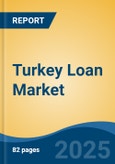Speak directly to the analyst to clarify any post sales queries you may have.
10% Free customizationThis report comes with 10% free customization, enabling you to add data that meets your specific business needs.
Key Market Drivers
Growth of the Small & Medium-Sized Enterprises
The expansion of Small and Medium-Sized Enterprises (SMEs) is a key driver of the Turkey loan market. SMEs represent 99.7% of all enterprises in Turkey as of 2023 and contribute significantly to employment, turnover, and GDP. Their growth requires access to financing for operations, expansion, and innovation, driving strong loan demand. Turkish banks and alternative lenders are offering specialized products, such as working capital loans and investment financing, tailored to SME needs. Government initiatives like the Credit Guarantee Fund (CGF) further ease SME access to credit, particularly during economic fluctuations. Additionally, the rise of fintech solutions has enabled quicker and more efficient loan approvals, expanding financing opportunities for SMEs. The continuous expansion of SMEs sustains the demand for loans and strengthens the broader Turkish loan market.Key Market Challenges
Higher Inflation & Interest Rates
Higher inflation and interest rates present significant challenges for Turkey’s loan market. Persistent inflation erodes consumer purchasing power, making loan repayments more difficult and discouraging new borrowing. To combat inflation, the CBRT has often raised interest rates, which raises the cost of loans and limits accessibility. Higher borrowing costs reduce demand for personal and business loans, while also increasing the financial burden on existing borrowers. This environment raises the risk of defaults and non-performing loans (NPLs), adding stress to lenders. Volatile inflation and interest rates create uncertainty, making it difficult for lenders and borrowers to plan effectively and hindering overall market growth.Key Market Trends
Shift to Short-Term Lending
The trend toward short-term lending is increasingly shaping Turkey’s loan market. Economic volatility, rising inflation, and higher interest rates are prompting consumers and businesses to prefer short-term financing options that provide quick access to liquidity without long-term debt commitments. Products such as payday loans, short-term personal loans, and revolving credit lines are becoming more popular among individuals, while SMEs are opting for short-term financing to cover operational expenses. Financial institutions are adapting by offering quick approval processes and flexible terms for short-term loans. While this trend addresses immediate financial needs, it also introduces risks such as debt rollover, as borrowers may find it challenging to repay loans within short periods, potentially leading to a borrowing cycle.Key Market Players
- Türkiye İş Bankası
- T.C. Ziraat Bankası A.Ş.
- Türk Ekonomi Bankası A.Ş.
- Türk Eximbank
- T. Garanti Bankası A.Ş.
- QNB BANK A.Ş.
- Nova Bank Ltd
- Alternatif Bank
- Kıbrıs Türk Kooperatif Merkez Bankası Ltd
- HSBC Bank A.S.
Report Scope:
In this report, the Turkey Loan Market has been segmented into the following categories, in addition to the industry trends which have also been detailed below.Turkey Loan Market, By Type:
- Secured Loan
- Unsecured Loan
Turkey Loan Market, By Provider Type:
- Banks
- Non-Banking Financial Companies
- Others
Turkey Loan Market, By Interest Rate:
- Fixed
- Floating
Turkey Loan Market, By Tenure Period:
- Less Than 5 Years
- 5-10 Years
- 11-20 Years
- More than 20 Years
Turkey Loan Market, By Region:
- Marmara
- Central Anatolia
- Mediterranean
- Aegean
- Southeastern Anatolia
- Blacksea
- Eastern Anatolia
Competitive Landscape
Company Profiles: Detailed analysis of the major companies present in the Turkey Loan Market.Available Customizations:
With the given market data, the publisher offers customizations according to a company's specific needs. The following customization options are available for the report.Company Information
- Detailed analysis and profiling of additional market players (up to five).
This product will be delivered within 1-3 business days.
Table of Contents
Companies Mentioned
- Türkiye İş Bankası
- T.C. Ziraat Bankası A.Ş.
- Türk Ekonomi Bankası A.Ş.
- Türk Eximbank
- T. Garanti Bankası A.Ş
- QNB BANK A.Ş.
- Nova Bank Ltd
- Alternatif Bank
- Kıbrıs Türk Kooperatif Merkez Bankası Ltd
- HSBC Bank A.S.








